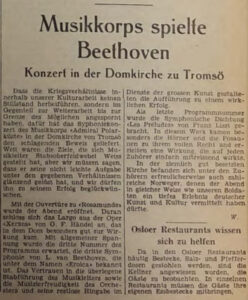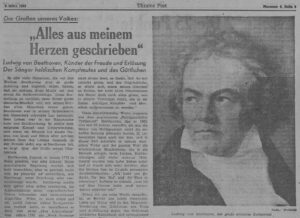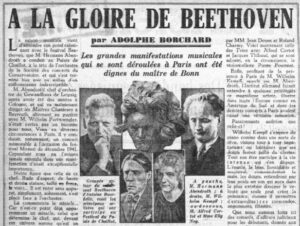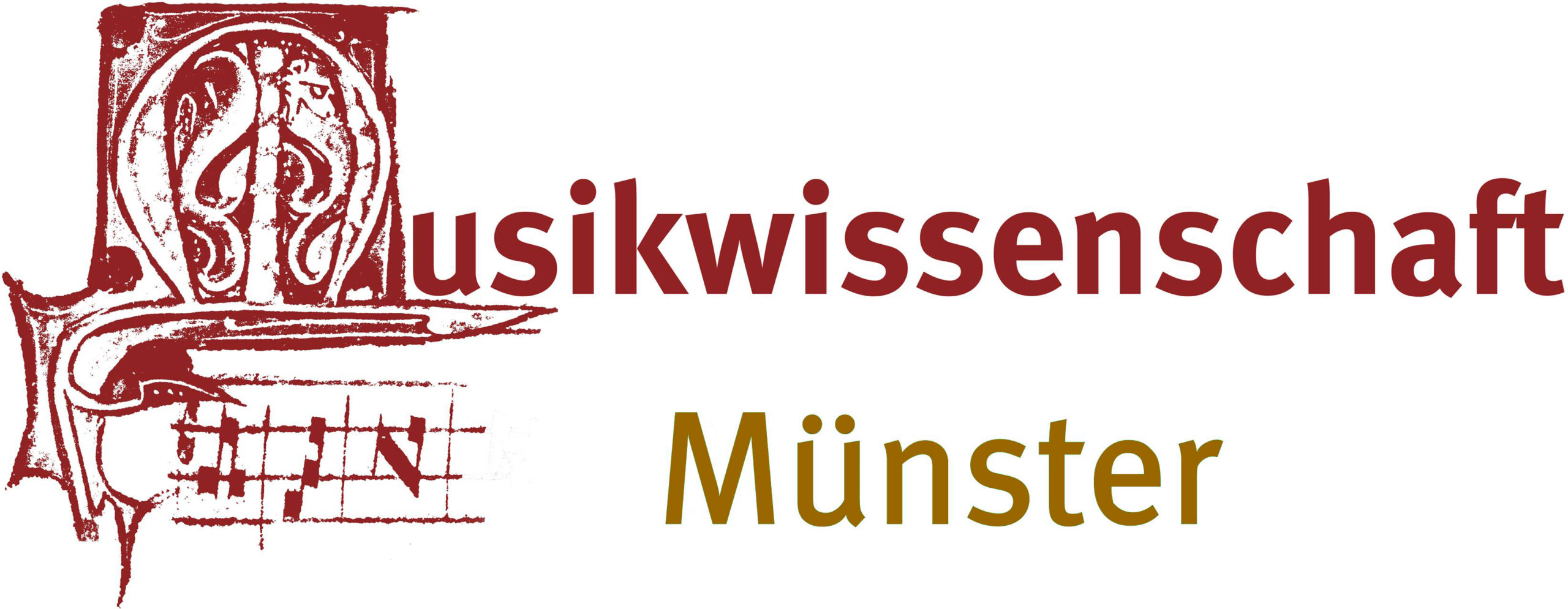Beethoven and His Music in Nazi-Occupied European Countries

Latest episode of our podcast »Claiming Beethoven«
Although cultural life in various Nazi-occupied countries manifested distinctive differences in outlook between 1939 and 1945, partially accountable to specific national traditions and their historical and ideological relationship to German music and the political situation, one factor that appears to bind all musical activity in these areas is the consistent presence of the music of Ludwig van Beethoven. The underlying motivations for giving Beethoven’s music special emphasis are as different as musical life in dictatorships and the occupied territories is controversial. Thus Beethoven was honored not only in official propaganda and military events, as well as in innumerable public concerts, but was also venerated in clandestine and resistance music making and in enforced circumstances in concentration camps. That Beethoven was able to serve the needs of the diametrically opposed ideological agendas of the German imperialists and the resistance movement is in itself a remarkable and unique phenomenon. It is undoubtedly a topic that warrants far more detailed scrutiny that hitherto, and for this reason a team of international researchers has been brought together with the experts of the Beethoven-Haus in Bonn to examine Beethoven reception during this problematic period in the greatest possible detail for an anthology scheduled for the upcoming Beethoven-year 2027.
This project has five specific aims:
- To reconstruct the presence and purpose of Beethoven’s music amongst others in Belgium, Croatia, Czechoslovakia, Denmark, France, Greece, Hungary, Italy, Latvia, Lithuania, Luxembourg, the Netherlands, Norway, Poland, Serbia, and Ukraine.
- To examine the importance of persecuted musicians as cultural ambassadors of an alternative, anti-Nazi Germany for example in Swedish and Swiss exile.
- To understand the reasons why some pieces were of special importance and to what extent this predilection for certain repertoire resonated with long-established traditions that may, or may not have been specific to a particular country.
- To learn whether this focus on Beethoven reception can lead to a more nuanced understanding of musical life in the occupied territories and their relationship to German culture.
- To ascertain whether the politicization of Beethoven during this period may have influenced the reception of the composer’s music in post-war Europe where once again Beethoven’s music played an important role in determining cultural diplomacy and international collaboration.
Team
Coordination
- Prof. Dr. Michael Custodis (University of Münster)
- Anna Maria Plischka, M.A. M.A. (University of Münster, assistance)
Advisory Board
- Dr. Jürgen Finger (DHI Paris)
- PD Dr. Lutz Klinkhammer (DHI Rome)
- Prof. Dr. Ruth Leiserowitz (DHI Warsaw)
- Prof. Dr. Oliver Rathkolb (Universität Wien)
- Prof. Dr. Albrecht Riethmüller (FU Berlin)
- Dr. Claus Røllum-Larsen (Royal Library Copenhagen)
Beethoven-Research and Cross-National Contributions
- Prof. Dr. Hans-Joachim Hinrichsen (Zürich): Introduction – The Reception of Beethoven on a European Scale prior to World War II
- Prof. Dr. Erik Levi (Royal Holloway University of London): Hermann Abendroth and Elly Ney – Agents of Forced Cultural Transfer. Beethoven-Performances in Occupied Europe
- PD Dr. Friedemann Pestel (Freiburg University): Playing Beethoven across “New Europe“. International Orchestral Tours and German Cultural Occupation
- Ass. Prof. Dr. Henrik Rosengren (University of Lund): Beethoven and the Neutral Sweden during the Second World War
- Prof. Dr. Christine Siegert and Yuval Dvoran (Beethoven-Haus Bonn): “Nach dem glücklich verlaufenen Westfeldzug“ – Sources in the Beethoven-Haus Concerning WWII
Regional Contributions
Belgium
- Prof. Dr. Eric Derom (University of Gent): Beethoven in Wartime Belgium – Programming Trends and Politics
- Prof. Dr. Christopher Murray (University of Brussels): Beethoven in Wartime Belgium. Musicological, Critical, and Educational Discourse
Bohemia and Moravia
- Prof. Dr. Lenka Křupková (Palacky University Olomouc): Beethoven as an Ambivalent Symbol in the Protectorate of Bohemia and Moravia
Croatia
- Dr. Tatjana Čunko (Croation Academy of Sciences and Arts Zagreb): The Presence and Purpose of Beethoven’s Music in Croatioa, 1941-45
Denmark
- Prof. Dr. Michael Fjeldsøe (University of Copenhagen): Beethoven-Reception in Denmark during the German Occupation
- Prof. Dr. Yvonne Wasserloos (Mozarteum University Salzburg): The Politics of Occupation in the Concert Hall. Musicians and Musical Repertoire at the Nordische Gesellschaft and its Relations to Beethoven
France
- Prof. Dr. Esteban Buch (EHESS Paris): Understanding Beethoven during the Vichy-Years: Reception in France, French Reception, French Idea
- Dr. Beate A. Kraus (Beethoven-Haus Bonn): Beethoven in France – Between Collaboration and Resistance
Greece
- Dr. Alexandros Charkiolakis (Friends of Music Society Athens): The Reception of Beethoven and His Music in Occupied Athens
Hungary
- Dr. Péter Bozó (Hungarian Academy of Sciences): „Beethoven, and once again Beethoven”. Dénes Bartha and His Music Reviews published in the daily newspaper ‚Pester Lloyd‘ (1939–1944)
Italy
- Prof. Dr. Friedrich Geiger (University of Music and Performing Arts Munich): “Symbol of German Essence”? Beethoven’s Music in Occupied Italy
- Prof. Dr. Mila De Santis (University of Florence): Beethoven at the Maggio Musicale Fiorentino (1939-44). Repertoire, Propaganda for the Regime and Liberation Song
Latvia
- Prof. Dr. Lolita Fūrmane (Latvian Academy of Music, Riga): Beethoven and the Symphonic Concerts in Latvian Radio 1942/43
- Dr. Zane Prēdele (Latvian Academy of Music, Riga): „Fidelio“ at the Riga Opera House (1944) – German Propaganda or Latvian Cultural Resistance?
Lithuania
- Prof. Dr. Danutė Petrauskaitė (Lithuanian Academy of Music and Theater, Vilnius): Ludwig van Beethoven’s Music in Lithuania in the Years of Historical Turning Points
Luxembourg
- Noemi Deitz (Hamburg/Luxembourg): The „Luxemburger Beethoventage“ (1942-44)
The Netherlands
- Prof. Dario van Gammeren (Trinity Laban Conservatoire of Music & Dance London): Beethoven Behind Barbed Wire. Music in Prison Camps in the Nazi-Occupied Netherlands
Norway
- Prof. Dr. Arnulf Mattes (University of Bergen): Heritage versus Politics. German Performance Traditions in Quisling’s Norway
Poland
- Prof. Dr. Magdalena Dziadek (University of Krakow): Under the Patronage of Beethoven – A Polish-German Cultural Dialogue in Upper Silesia
- Ass. Prof. Dr. Katarzyna Naliwajek (University of Warsaw): Beethoven in Nazi-Occupied Poland
- Hubert Szczęśniak (City University of London): The Reception of Ludwig van Beethoven’s Music in Nazi-Occupied Krakow
Serbia
- Dr. Tatjana Marković (Austrian Academy of Sciences): The Reception of Beethoven and his Work in Serbia in the Interwar Period
- Dr. Ivana Medić (Serbian Academy of Sciences and Arts): The Reception of Beethoven in the Territory of the Military Commander in Serbia (Gebiet des Militärbefehlshabers in Serbien), 1941-1944
Ukraine
- Eleonora Maksiutenko (WWU Münster): Beethoven Between All Fronts. Regarding the Music Life in Nazi-Occupied Ukraine (1941-44)











